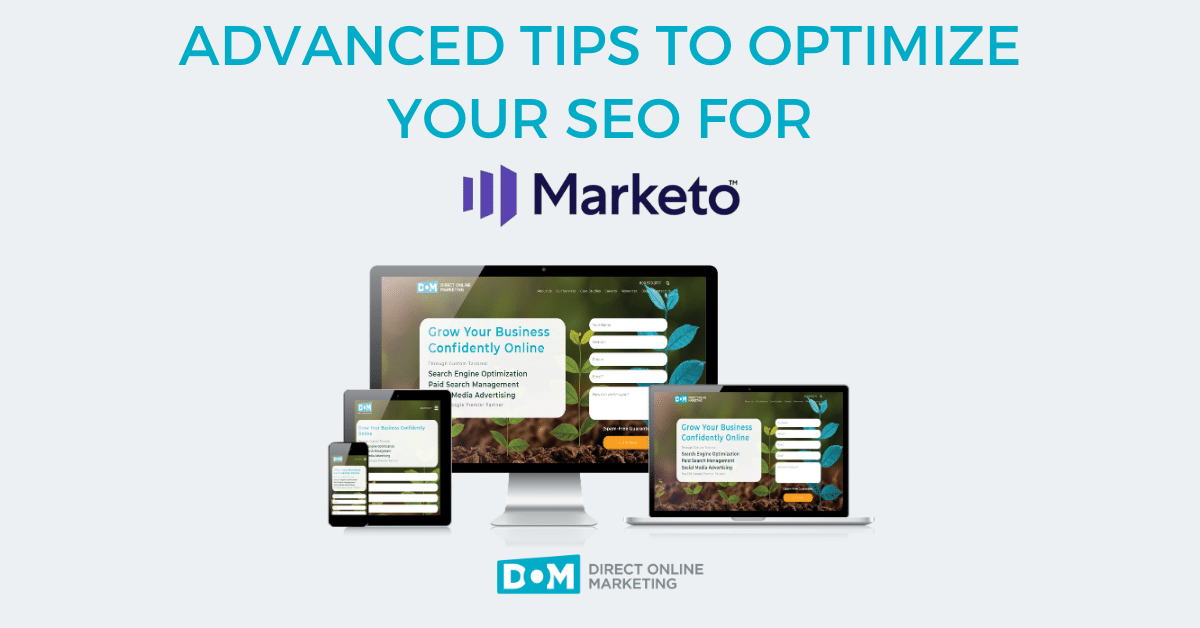
Updated June, 3, 2024
As highly capable digital marketers, we have an unprecedented number of tools to help us do our jobs. Last time we checked (a few minutes ago), the most popular marketing automation software, coming in with around 20% of the market share, was Adobe’s Marketo platform. If you have anything whatsoever to do with digital marketing, you know how prevalent Marketo is. Most implementations are centered around their handy landing pages. So most of our Marketo SEO tips are most relevant for the landing page templates, though you can use that platform for other things, too.
Just like anything else you want your customer to find via a search engine, your Marketo pages need to be optimized for SEO. Here are our top tips to get the most out of your SEO for Marketo.
Marketo SEO Tip 1: Just do the SEO thing.
You know the thing we’re talking about: optimize that page for search engines! If you want to know more about how to do that, we have a whole bunch of resources to help you. Trust us, we’re experts. In fact, below is a list of blog posts we’ve written over the years to help you out with some of the SEO basics.
- Image SEO: Does Alt Text Still Matter?
- Internal Links: How Much Do They Affect SEO?
- Why SEO Titles and Meta Descriptions Are Still Important
- Does Duplicate Content Affect SEO?
That said, if you’re up to speed already on the SEO basics, this post is for more advanced users who really want to squeeze the most value they can out of their Marketo assets.
Marketo SEO Tip 2: Learn how to edit html.
We’re not trying to be glib (well, maybe a little), but you will get a lot of mileage out of the simple small step of popping open a copy of HTML Programming for Stupid People, or whatever those books are called, and teaching yourself some basic coding. It’s not difficult—html is definitely one of the easier programming languages to learn—and you’ll enable yourself to do stuff like these sub-tips.
Need a reason to learn to code HTML? Here’s why you should learn to code HTML in case you want some reasons why.
Marketo SEO Sub-Tip A: Add canonical links to your header tags.
Don’t be alarmed, it’s easier than it sounds. You can freely edit the HTML of the Marketo headers (everything between the <head> tags on a webpage). One of the most useful ones is the canonical link. We use canonical links all the time as a way of telling search engines that potentially duplicate content is intentional and need not be indexed. Google famously dislikes duplicate content, and we all know what happens to content Google doesn’t like.
It gets ranked lower. That’s all.
You won’t lose your listing, but your organic searches will suffer. This is especially true for Marketo pages because they tend to multiply based on the SKUs, products, or services being marketed, and similar page content can trigger false duplicate flags to Google’s crawlers. That’s the opposite of what we want.
Marketo SEO Sub-Tip B: Add Google Analytics code and various pixels to the header tag manually.
While you’re editing the header, you might as well take this step while you’re there. By “manually” we mean “by hand,” as in “you have to code it yourself” because Marketo doesn’t let you do it as easily as other web design interfaces (like WordPress, for example). You can get the embed codes from the websites you use to track whatever it is you’re tracking, and your little bit of coding knowledge will come in very handy.
Marketo SEO Tip 3: Make sure your gated content is protected by noindex tags.
One of the most useful techniques for a digital marketer is to put valuable content behind a conversion link, like a newsletter signup. This lets us get something valuable in exchange for something valuable, which your gated content most definitely should be. But if that valuable content is visible to Google, then simple searches can bypass your gate and your hard work goes unrewarded.
Make sure to add the noindex tag in the headers of the pages that host your content, not the landing page itself. That’s a great way to make sure Google loses track of your page, which, again, is the opposite of what we want. Don’t take our word for it—check out Google’s own knowledge base about noindex tags.
Want to get more in-depth on our tips for gated content besides making sure search engines can’t crawl it? Check out our definitive guide to gated content.
Marketo SEO Tip 4: Link to your landing pages on your website.
This could probably be included in Tip 1, technically, but we see it so often that it merits its own mention. The tendency is to pretend like your landing pages aren’t part of your website’s ecology, but that’s not doing your SEO any favors. We’ve already seen how much Google likes links, so don’t be afraid to link it in your site navigation, in blog posts, wherever your favorite links live.
Marketo SEO Tip 5: Make sure you’re secure.
You have to make certain you’re using the https prefix with Marketo, especially when you’re linking to it from your website. Not only does Google prefer secure pages, but a link from a secure site to an insecure one might raise a flag on your customer’s browser. And flags are bad.
Those might be our most important MarketoSEO tips, but we could go on. Schedule a free consultation today and maybe we’ll share them with you.


